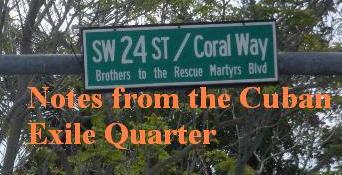"Calculate that by the 1st week of February I will have my passport be able to travel... fingers crossed. I'll believe it when I am in the plane!" - Yoani Sanchez, over twitter today.
In October of 2012 the regime in Cuba announced migration reforms that would take effect today January 14, 2013. Cubans on the island are going through the motions, but many are as skeptical as Yoani Sanchez on whether they will be able to travel. Not so, John McAuliff of the Fund for Reconciliation and Development, who lobbies for engagement between the United States government and the dictatorship in Cuba and was quoted today in an article by the Associated Press saying that "Cuba now provides greater freedom of travel to virtually all of its citizens than does the U.S."
With all due respect to Mr. McAuliff but the above statement is not borne out by the facts and would earn him the laughter of many Cubans. For example, Rosa María Payá was not allowed by the Cuban government to travel to Santiago, Chile between January 8 through the 15th. Its not only the Cubans that contradict his claim.
CNN on January 11, 2012 reported the following:
This is not the first time that the press and "Cuba experts" have jumped on a Castro regime announcement while ignoring news that contradicts their optimistic assessment.
For example On August 8, 2012 BBC News reported that Cuba's ban on anti-Castro musicians had been quietly lifted. Others soon followed reporting on the news. The stories specifically mentioned Celia Cruz as one of the artists whose music would return to Cuban radio.
Diario de Cuba reported on August 21, 2012 that Tony Pinelli, a well known musician and radio producer, distributed an e-mail in which Rolando Álvarez, the national director of the Cuban Institute of Radio and Television Instituto Cubano de Radio y Televisión (ICRT) confirmed that the music of the late Celia Cruz would continue to be banned. The e-mail clearly stated: "All those who had allied with the enemy, who acted against our families, like Celia Cruz, who went to sing at the Guantanamo Base, the ICRT arrogated to itself the right, quite properly, not to disseminate them on Cuban radio."
Whether it is the issue of censorship or freedom to travel the regime in Cuba has made lots of noise but the underlying policies of control and repression remain intact. Meanwhile things are getting worse.
Opposition leaders are dying under suspicious circumstances and the overall human rights situation in Cuba is deteriorating. The dictatorship is remaining silent about Cholera outbreaks across the island. Its behavior is that of a classic totalitarian regime. The changes carried out by the Cuban dictatorship are new rules for the same old game: hanging on to power.
 |
| AP Photo/Ramon Espinosa |
With all due respect to Mr. McAuliff but the above statement is not borne out by the facts and would earn him the laughter of many Cubans. For example, Rosa María Payá was not allowed by the Cuban government to travel to Santiago, Chile between January 8 through the 15th. Its not only the Cubans that contradict his claim.
CNN on January 11, 2012 reported the following:
After weeks in which passport applications surged and just days before the new policy takes affect, Cuba this week "began to increase the information about the update announced last October," according to a story from the state-run Prensa Latina News Agency. Cuba faces holiday travel crisis Specifically, the Labor and Social Security Ministry defined categories of Cubans whose travel would be restricted. They include those who may be "criminally prosecuted, are subject to military service or (are denied) for reasons of defense and national security." "Also on the list are citizens who have obligations with the state or are not authorized under rules designed to preserve the skilled workforce and protect official information," read the Presna Latina story.The United States government does not restrict doctors and athletes from traveling outside of the country. It also does not restrict between 70,000 and 300,000 US citizens from returning to their homeland. The Castro regime does engage in these practices. To claim that the Cuban dictatorship offers greater freedom to travel than the United States is a falsehood that is absurd.
This is not the first time that the press and "Cuba experts" have jumped on a Castro regime announcement while ignoring news that contradicts their optimistic assessment.
For example On August 8, 2012 BBC News reported that Cuba's ban on anti-Castro musicians had been quietly lifted. Others soon followed reporting on the news. The stories specifically mentioned Celia Cruz as one of the artists whose music would return to Cuban radio.
Diario de Cuba reported on August 21, 2012 that Tony Pinelli, a well known musician and radio producer, distributed an e-mail in which Rolando Álvarez, the national director of the Cuban Institute of Radio and Television Instituto Cubano de Radio y Televisión (ICRT) confirmed that the music of the late Celia Cruz would continue to be banned. The e-mail clearly stated: "All those who had allied with the enemy, who acted against our families, like Celia Cruz, who went to sing at the Guantanamo Base, the ICRT arrogated to itself the right, quite properly, not to disseminate them on Cuban radio."
Whether it is the issue of censorship or freedom to travel the regime in Cuba has made lots of noise but the underlying policies of control and repression remain intact. Meanwhile things are getting worse.
Opposition leaders are dying under suspicious circumstances and the overall human rights situation in Cuba is deteriorating. The dictatorship is remaining silent about Cholera outbreaks across the island. Its behavior is that of a classic totalitarian regime. The changes carried out by the Cuban dictatorship are new rules for the same old game: hanging on to power.





This comment has been removed by a blog administrator.
ReplyDelete